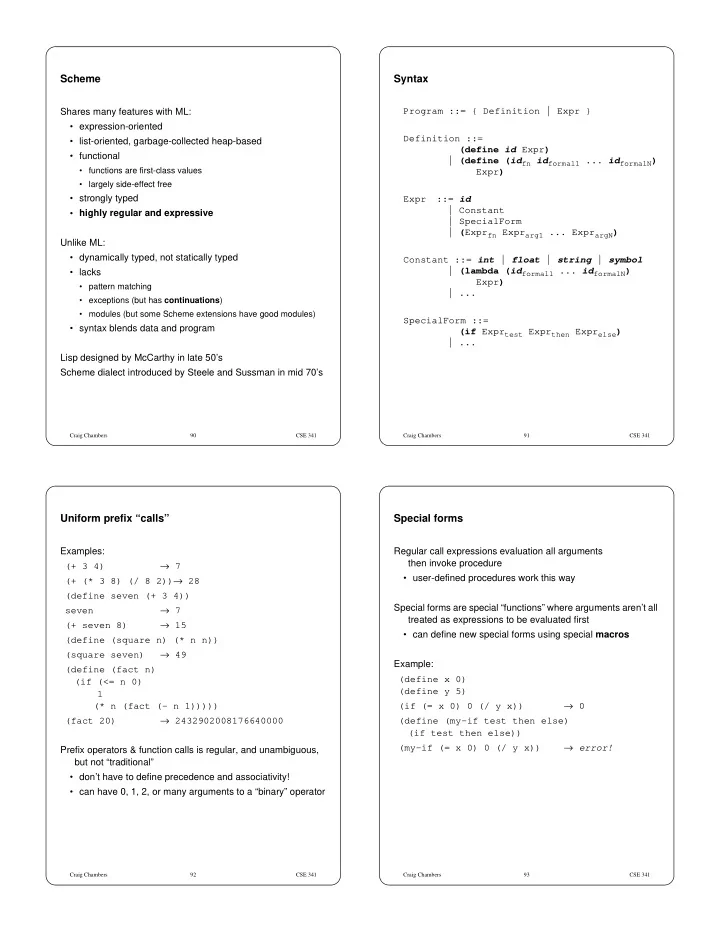

Scheme Syntax Program ::= { Definition | Expr } Shares many features with ML: • expression-oriented Definition ::= • list-oriented, garbage-collected heap-based (define id Expr ) • functional | (define ( id fn id formal1 ... id formalN ) • functions are first-class values Expr ) • largely side-effect free Expr ::= id • strongly typed | Constant • highly regular and expressive | SpecialForm | ( Expr fn Expr arg1 ... Expr argN ) Unlike ML: • dynamically typed, not statically typed Constant ::= int | float | string | symbol | (lambda ( id formal1 ... id formalN ) • lacks Expr ) • pattern matching | ... • exceptions (but has continuations ) • modules (but some Scheme extensions have good modules) SpecialForm ::= • syntax blends data and program (if Expr test Expr then Expr else ) | ... Lisp designed by McCarthy in late 50’s Scheme dialect introduced by Steele and Sussman in mid 70’s Craig Chambers 90 CSE 341 Craig Chambers 91 CSE 341 Uniform prefix “calls” Special forms Examples: Regular call expressions evaluation all arguments → 7 then invoke procedure (+ 3 4) • user-defined procedures work this way (+ (* 3 8) (/ 8 2)) → 28 (define seven (+ 3 4)) → 7 Special forms are special “functions” where arguments aren’t all seven treated as expressions to be evaluated first → 15 (+ seven 8) • can define new special forms using special macros (define (square n) (* n n)) → 49 (square seven) Example: (define (fact n) (define x 0) (if (<= n 0) (define y 5) 1 → 0 (* n (fact (- n 1))))) (if (= x 0) 0 (/ y x)) → 2432902008176640000 (fact 20) (define (my-if test then else) (if test then else)) → error! (my-if (= x 0) 0 (/ y x)) Prefix operators & function calls is regular, and unambiguous, but not “traditional” • don’t have to define precedence and associativity! • can have 0, 1, 2, or many arguments to a “binary” operator Craig Chambers 92 CSE 341 Craig Chambers 93 CSE 341
Other special forms Lists cond : like if - elseif -...- else chain: Translation between ML and Scheme ( cond ((> x 0) 1) ML Scheme ((= x 0) 0) nil () ( else -1)) x :: xs (cons x xs) [x, y, z] (list x y z) Short-circuiting and and or (like ML’s andalso and orelse ) hd(lst) (car lst) ( or (= x 0) (> (/ y x) 5) ...) tl(lst) (cdr lst) null(lst) (null? lst) let : “simultaneous” local variable bindings: ( define x 1) ( define y 2) ( define z 3) ( let ((x 5) Examples: (y (+ 3 4)) (define lst (list 5 6 7 8)) → (5 6 7 8) (z (+ x y z))) (define lst2 (cons 4 lst)) → (4 5 6 7 8) → 5+7+(1+2+3)=18 (+ x y z)) → 9 (+ (car lst) (car lst2)) → (6 7 8) (define lst3 (cdr lst)) let* : “sequential” local variable bindings (like ML’s let ): • lst , lst2 , and lst3 have shared subpieces ( let* ((x 5) (y (+ 3 4)) (z (+ x y z))) → 5+7+(5+7+3)=27 (+ x y z)) Craig Chambers 94 CSE 341 Craig Chambers 95 CSE 341 Dynamic typing Type testing There are no static types, neither explicit nor inferred Programs can test the type of values at run-time Any variable, and any data structure, can hold any type of value Values have (run-time) types, variables are typeless Some type-testing predicates: null? pair? Typechecking is performed only when absolutely necessary E.g. symbol? • car & cdr check that argument is a cons cell, and boolean? • + checks that arguments are numbers, but number? integer? ... • cons and list check nothing! string? ... Lists can be heterogenous: (list 3 4.5 () "hi" (list 3 5)) → (3 4.5 () "hi" (3 5)) • lists in Scheme fulfill roles of both tuples and lists in ML E.g. an association list of key-value pairs: (define Zips (list (list "Seattle" 98195) (list "Boston" 02115) (list "Reston" 22091))) → (("Seattle" 98195) ("Boston" 02115) ("Reston" 22091)) Craig Chambers 96 CSE 341 Craig Chambers 97 CSE 341
Typechecking terms Quoting List literals via quote or ' special form: Static vs. dynamic typing : when are type checks performed? → (3 (4 5) 6) (list 3 (list 4 5) 6) • static: before execution → (3 (4 5) 6) • dynamic: during execution (quote (3 (4 5) 6)) → (3 (4 5) 6) '(3 (4 5) 6) Pure static typing is too restrictive, so statically typed languages often mix static and dynamic checking Quoted identifiers are symbol constants: Strong vs. weak typing : how comprehensive are type checks? → positive 'positive • strong: guarantee no run-time misuses (car '(if (> a b) 3 4)) → if • weak: don’t The two dimensions are independent Programs and data share same regular syntax Makes it very easy to write programs that Type errors are a somewhat arbitrary subclass of program errors build, take apart, and transform programs Typechecking doesn’t address non-type errors Craig Chambers 98 CSE 341 Craig Chambers 99 CSE 341
Recommend
More recommend